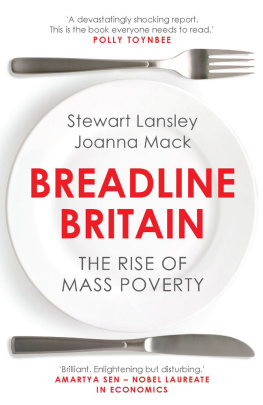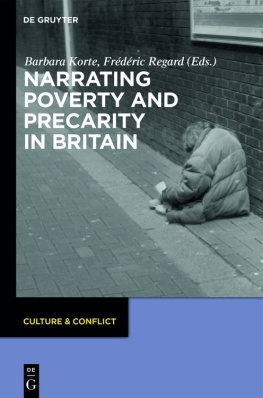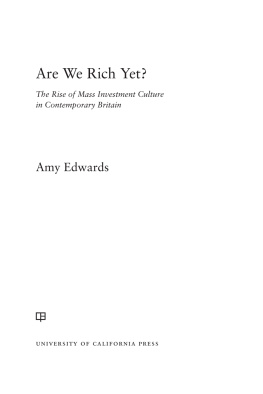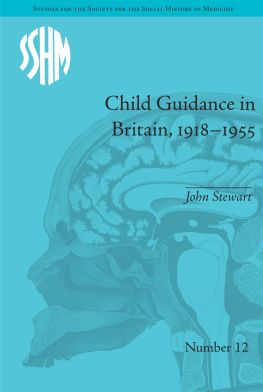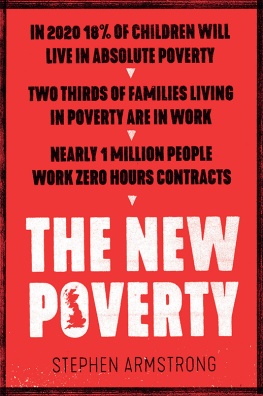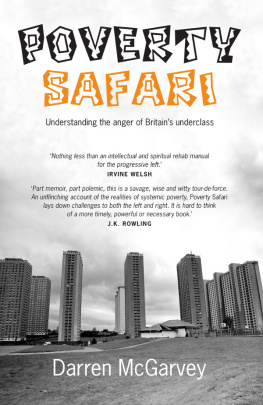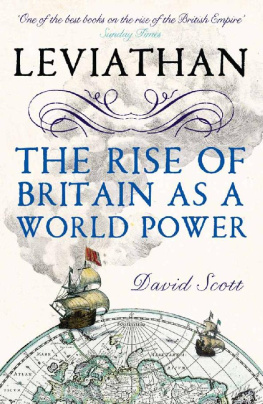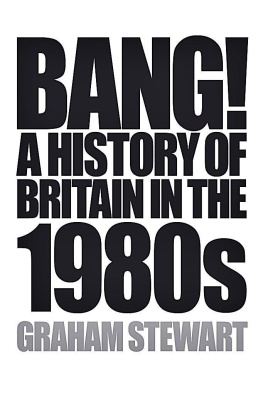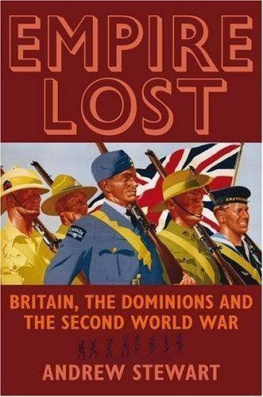Lansley Stewart - Breadline britain - the rise of mass poverty
Here you can read online Lansley Stewart - Breadline britain - the rise of mass poverty full text of the book (entire story) in english for free. Download pdf and epub, get meaning, cover and reviews about this ebook. year: 2015, publisher: Oneworld Publications, genre: Politics. Description of the work, (preface) as well as reviews are available. Best literature library LitArk.com created for fans of good reading and offers a wide selection of genres:
Romance novel
Science fiction
Adventure
Detective
Science
History
Home and family
Prose
Art
Politics
Computer
Non-fiction
Religion
Business
Children
Humor
Choose a favorite category and find really read worthwhile books. Enjoy immersion in the world of imagination, feel the emotions of the characters or learn something new for yourself, make an fascinating discovery.
- Book:Breadline britain - the rise of mass poverty
- Author:
- Publisher:Oneworld Publications
- Genre:
- Year:2015
- Rating:3 / 5
- Favourites:Add to favourites
- Your mark:
- 60
- 1
- 2
- 3
- 4
- 5
Breadline britain - the rise of mass poverty: summary, description and annotation
We offer to read an annotation, description, summary or preface (depends on what the author of the book "Breadline britain - the rise of mass poverty" wrote himself). If you haven't found the necessary information about the book — write in the comments, we will try to find it.
Breadline britain - the rise of mass poverty — read online for free the complete book (whole text) full work
Below is the text of the book, divided by pages. System saving the place of the last page read, allows you to conveniently read the book "Breadline britain - the rise of mass poverty" online for free, without having to search again every time where you left off. Put a bookmark, and you can go to the page where you finished reading at any time.
Font size:
Interval:
Bookmark:
ABOUT THE AUTHORS
Stewart Lansley is a visiting fellow at Bristol University. He has written extensively on poverty, wealth and inequality for specialist journals as well as the Guardian and the Independent . His book, The Cost of Inequality , was shortlisted for the Spears business book awards for 2012.
Joanna Mack was the Open Universitys lead on the 2012 Poverty and Social Exclusion study, including the research resource www.poverty.ac.uk. She was the Principal Investigator of the 1983 Breadline Britain research which pioneered poverty measurement based on publicly determined needs, now widely used internationally.
They are co-authors of Poor Britain , 1983, and have collaborated on work on poverty from the Breadline Britain surveys to www.poverty.ac.uk. They are both award-winning television producers.
Acknowledgments
This book, even more than most, is the product of joint effort. We are indebted to the Economic and Social Research Council for funding the 2012 Poverty and Social Exclusion research (ESRC grant 060-25-0052); to London Weekend Television (now part of ITV) which funded the 1983 and the 1990 surveys; to Brian Gosschalk of MORI (now Ipsos MORI) for carrying out the 1983 and 1990 surveys; and to the Joseph Rowntree Foundation for funding the 1999 survey (and for additional funding for the 1990 survey analysis).
We would like to offer a special thanks to the scores of families and individuals who across all the years often in difficult circumstances have so generously shared their experiences with us. We have drawn on these for the case studies in the book. The studies are, of course, specific to the situation facing the families at the time they were conducted. Without their generous participation our understanding of the everyday realities of life for those living in poverty in a modern, affluent society would have been much diminished.
We would also like to thank the many voluntary organisations across the UK who have helped; in particular, the groups in Birmingham, Glasgow and Gloucestershire who helped with the PSE qualitative research on the experiences of low-income families during the recession and the Community Foundation for Northern Ireland for their collaborative work on their participatory Communities in Action project. We would also extend a particular thanks to Children North East and the North East Child Poverty Commission and to Poverty Alliance Scotland and the Poverty Truth Commission Scotland.
The book draws heavily on the work of others, over many decades, notably on the pioneering work of Professor Peter Townsend. Peter devoted much of his life to attempting to improve the lives of the poorest in Britain in so many ways. He developed the relative deprivation method for measuring poverty and was a key member of the bid team for the 2012 study but, sadly, he died in 2009.
The 2012 PSE project has been a collaborative effort between teams across six universities in England, Scotland and Northern Ireland: the University of Bristol (lead), Heriot-Watt University, the Open University, Queens University Belfast, the University of Glasgow and the University of York. The academic research team has worked in close partnership with two survey organisations, the National Centre for Social Research (NatCen) in Britain and the Northern Ireland Statistics and Research Agency (NISRA).
We owe a special thanks to Professor David Gordon, head of the Townsend Centre for International Poverty Research and the lead on the 2012 study, and with whom we have collaborated closely over many years, going back to 1990. He steered the project and was a constant source of help and guidance throughout. We are heavily indebted to Dr Demi Patsios of the University of Bristol for his generosity in giving up much of his time to help to generate many of the data sets used; without these, the book would not have appeared. We are also indebted to Dr Gill Main and Dr Shailen Nandy for their help with the analysis of the data.
We are especially grateful to Dr Simon Pemberton, who very generously read through an early draft of the book and made numerous helpful and insightful comments and who guided us through the PSE qualitative research on low-income families. Thanks too to Gabi Kent, the community engagement lead on the PSE project, whose work with the CFNI team in Northern Ireland and with numerous organisations across the UK helped immeasurably in enabling us to better understand the ways in which communities can organise for change.
The contributions made by our research colleagues and members of the PSE research team cannot be underestimated and we appreciate that many of the ideas in this book have resulted from their work and conversations with them. We would particularly like to thank: Professor Nick Bailey, Dr Karen Bell, Dr Kirsten Besemer, Professor Jonathan Bradshaw, Professor Glen Bramley, Professor Mary Daly, Dr Esther Dermott, Dr Eldin Fahmy; Maria Gannon, Dr Pauline Heslop, Nikki Hicks, Professor Paddy Hillyard, Grace Kelly, Dr Mark Livingston, Professor Ruth Levitas, Christina Pantazis, Professor Sarah Payne, Marco Pomati, Ronan Smyth, Eileen Sutton, Professor Mike Tomlinson and Lisa Wilson.
We have drawn heavily on the PSE project website www.poverty.ac.uk and we are indebted to our colleagues at the Open University who worked on the initial development of the site and to Steve Yates and Beverley Daley (from Xited Ltd) for its further development. A particular thanks to Pete Mitton, who throughout has generously shared his knowledge of web development and data visualisation, Ken Jones, who helped keep on top of news and reports during the period of the project research, and Sasha Laurel-Jagroo who, with great enthusiasm and dedication, has managed feedback from the website and the PSE twitter feed, enabling us to get a better understanding of the current debates. We also owe much to the very many other colleagues at the Open University both in the Social Science faculty and in the learning and teaching centre (LTS) who have been generous with their time, ideas and support. Thanks also go to Roshni Amin who has helped cover other work while the book was being written.
We are grateful for the feedback from a number of presentations at conferences and events including those organised by the Bristol Festival of Economics, the third Townsend Memorial Conference in 2014, the Centre for Labour and Social Studies, the ESRC Britain in 2014 launch, the Equality Trust, the Northern Ireland Council for Voluntary Organisations, the OECD, Oxfam Scotland, the Royal Society of Arts, the Scottish Council for Voluntary Organisations, the Social Policy Association, Globalnet21, the Think-Tank for Action on Social Change, Dublin, and various ESRC-funded seminars on inequalities research. Many others from charitable organisations, pressure groups and academics involved in related research have supported both the research project and this book. A particular thanks to the Households Below Average Income analysts (in the Department for Work and Pensions) for their help unravelling the history of poverty measurement and to Church Action on Poverty for their kind permission to use their Britain isnt eating poster.
Huge thanks, too, to Andrew Lownie, our ever-supportive agent, and to Mike Harpley at Oneworld, whose determined editing has made for an immensely improved and, hopefully, more readable book.
Last, but far from least, we are grateful to Anne Rannie and Harold, Jonathan and David Frayman, for their unwarranted patience, endurance and support during the writing of this book. Anne volunteered, cheerfully, to take on the task of reading a number of early chapters and has been an immense source of encouragement and sanity throughout. Jonathan and David were throughout a source of constructive challenge and innumerable ideas. Harold, who shares with us the distinction of having been involved in this work since its conception back in 1983, still found the energy and interest for continuing our discussions on the underlying method and to comment on drafts.
Next pageFont size:
Interval:
Bookmark:
Similar books «Breadline britain - the rise of mass poverty»
Look at similar books to Breadline britain - the rise of mass poverty. We have selected literature similar in name and meaning in the hope of providing readers with more options to find new, interesting, not yet read works.
Discussion, reviews of the book Breadline britain - the rise of mass poverty and just readers' own opinions. Leave your comments, write what you think about the work, its meaning or the main characters. Specify what exactly you liked and what you didn't like, and why you think so.

